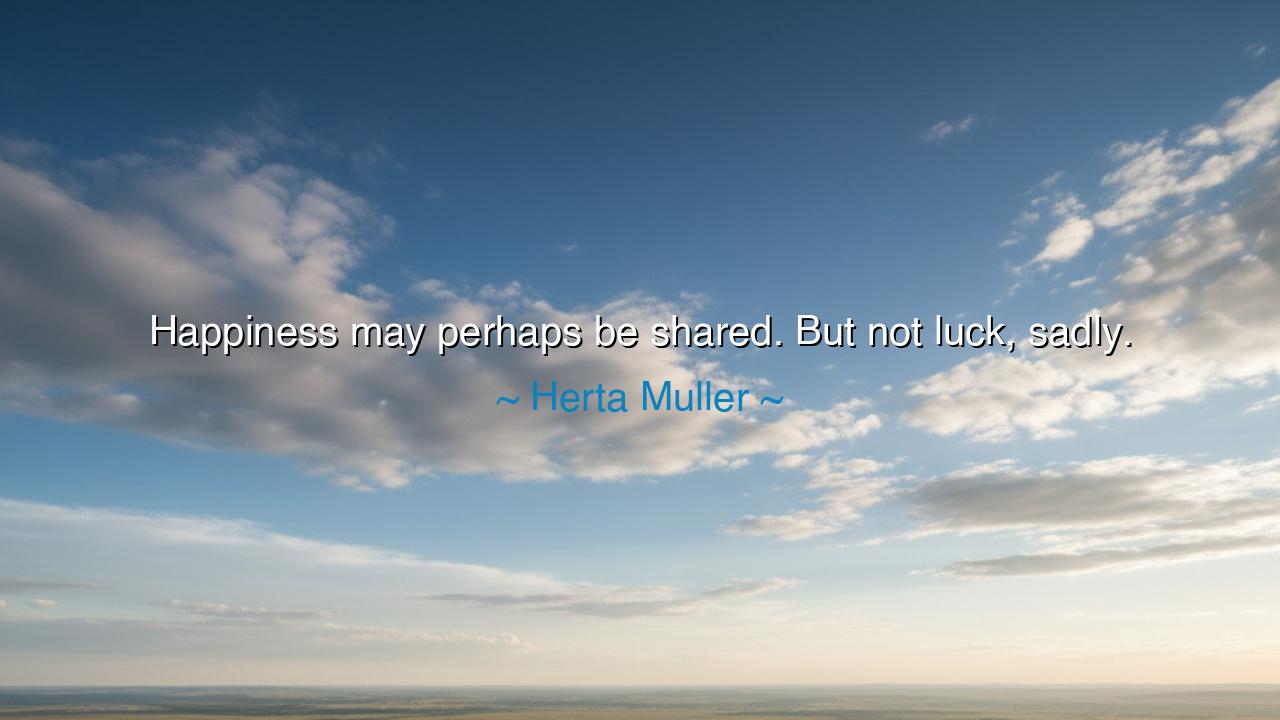
Happiness may perhaps be shared. But not luck, sadly.






When Herta Müller, the Nobel laureate and survivor of tyranny, wrote, “Happiness may perhaps be shared. But not luck, sadly,” she spoke from the depth of a life shaped by hardship and reflection. Her words are not bitter, but truthful, carved from the stone of experience. They reveal a fundamental law of existence—that while joy can overflow from one soul to another, fortune remains solitary, unpredictable, and beyond the reach of human will. In her quiet wisdom, Müller reminds us that happiness is a work of the heart, born of love and connection, while luck is the plaything of fate, scattered by winds no mortal hand can guide.
Müller’s life gives context to her insight. Born in Romania under a brutal dictatorship, she grew up amidst fear, censorship, and repression. She knew what it meant to have one’s life dictated by the arbitrary power of others—where survival often depended not on merit or goodness, but on luck. Those who happened to be in the wrong place vanished; those who were spared did not always know why. In such a world, Müller learned to see that happiness, fragile though it is, can still be cultivated by courage and compassion. It may be shared, offered through friendship, beauty, and truth. But luck—that invisible current that decides who lives and who suffers—cannot be given away. It is solitary, impartial, and often cruel.
This distinction between happiness and luck reaches back through the ages. The ancient Greeks called luck tyche—a goddess both generous and merciless. Even kings trembled before her, for no wisdom or virtue could compel her favor. Yet happiness, or eudaimonia, as Aristotle described it, was different—it could be earned through character, through the practice of virtue, courage, and wisdom. Müller’s insight echoes this same eternal truth: that while we cannot command the fortune that befalls us, we can still choose how to respond. The winds of chance may blow as they will, but the hearth of joy is kindled by human hands.
Consider the story of Anne Frank, whose brief life illuminates this paradox with heartbreaking clarity. Born into a loving family, she knew the warmth of shared happiness even as the world around her fell into chaos. Her diary, written in hiding, speaks of laughter, hope, and dreams in the shadow of terror. Luck did not favor her—she perished in the darkness of a camp—but her words, infused with the will to find happiness amid despair, continue to bless millions. Her fortune was cruel, but her spirit was luminous. Thus, her story teaches us what Müller understood: that happiness may be fragile, but it is communicable; luck is solitary, but happiness, even in death, may still be shared across generations.
To say that luck cannot be shared is not to despair, but to awaken. It is to understand that life’s blessings and tragedies are not always just, that the rain falls unevenly upon the fields of men. Yet in that unevenness lies the call to compassion. We cannot transfer our luck to another, but we can use our fortune to ease another’s burden. We cannot alter the stars that govern fate, but we can choose to shine for one another. The one who knows their privilege of luck should not boast of it, but transform it into generosity; the one who lacks it must not curse the heavens, but find solace in shared humanity. In this balance lies the nobility of the human heart.
Müller’s reflection carries also a quiet sorrow—the recognition that life is never fair. She writes as one who has seen good people fall while the cruel thrive. Yet her words hold no bitterness, only clarity. For she sees that happiness is an art of the spirit, while luck is a game of the gods. Happiness is built upon love, forgiveness, and meaning; luck is born of circumstance, indifferent to the deserving or undeserving. To base one’s peace on luck is to build on sand; to base it on love is to build upon stone.
So, my children of the present age, take heed of her wisdom: do not envy the lucky, but cultivate the joyful. When fortune smiles, use its light to bless others. When it frowns, do not let it dim the flame within you. Share your happiness freely—it multiplies when given. But do not mourn that luck cannot be shared; rather, seek to make happiness the companion of all, so that even when fate divides us, kindness will unite us. For in the end, luck is fleeting and faithless—but happiness, once shared, becomes immortal.






AAdministratorAdministrator
Welcome, honored guests. Please leave a comment, we will respond soon